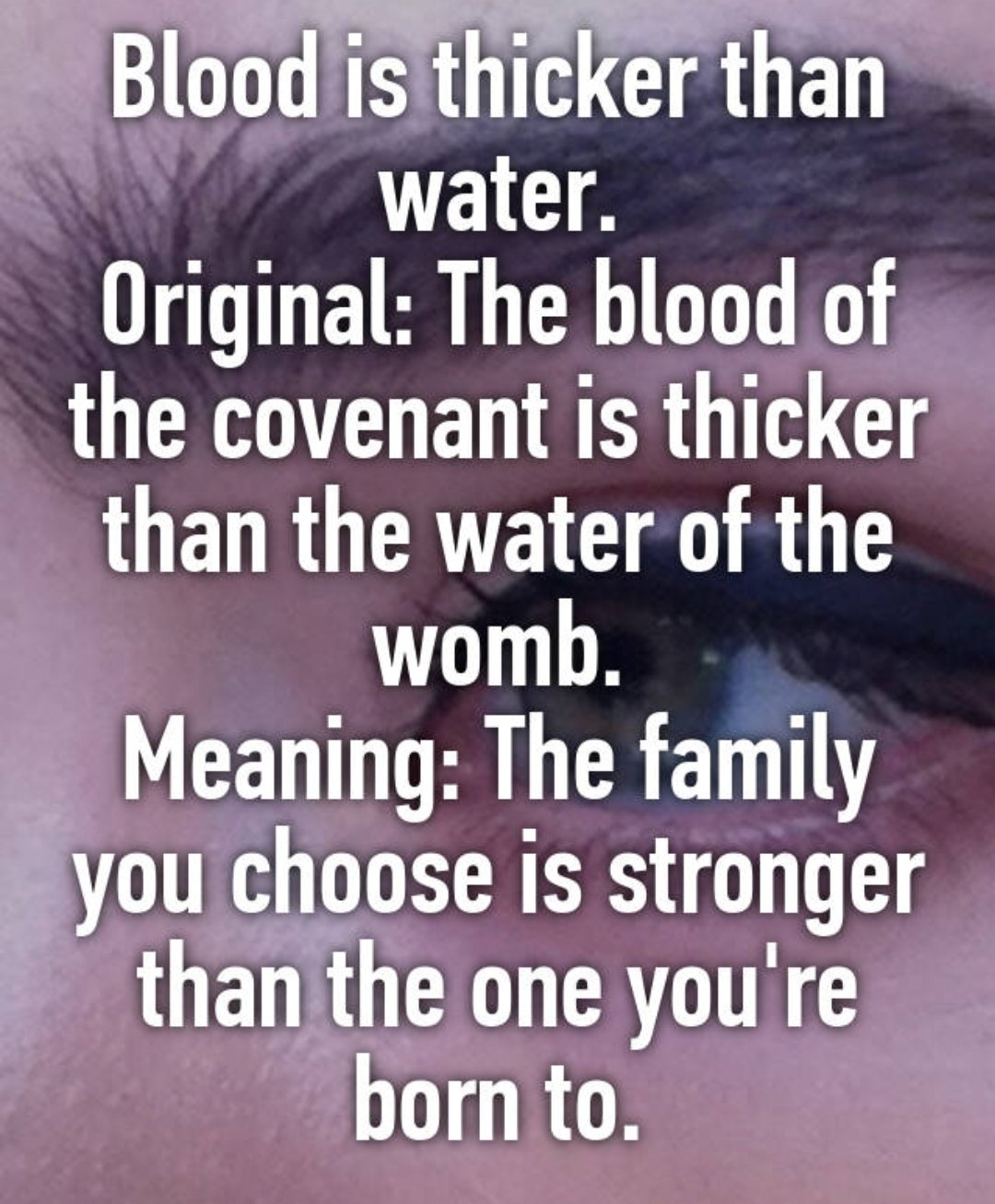Blood ties have always been considered sacred and irreplaceable in human relationships. The phrase "blood thicker than water full" captures the essence of loyalty, connection, and the unbreakable bond that family members share. This timeless expression has resonated with cultures worldwide, emphasizing how biological connections often supersede external relationships. In today's fast-paced world, where individualism often takes precedence, exploring the meaning behind this phrase becomes even more relevant. Understanding its origins, implications, and modern interpretations can provide valuable insights into the importance of family in shaping our lives.
From ancient civilizations to modern societies, the concept of "blood thicker than water full" has played a pivotal role in defining familial relationships. It serves as a reminder of the unconditional support and trust that family members offer one another. While the phrase itself may seem straightforward, its depth lies in the emotions and experiences it encapsulates. As we delve deeper into this topic, we'll uncover the historical context, cultural significance, and psychological aspects that make this saying so powerful.
For many, the idea of "blood thicker than water full" represents the foundation of personal identity and belonging. It reflects the idea that family is not just a biological connection but also a source of strength, guidance, and emotional security. In this article, we will explore the origins of this phrase, its relevance in contemporary times, and how it influences our perceptions of family dynamics. By the end, you'll have a comprehensive understanding of why this saying continues to resonate across generations.
Read also:Unpacking Julio Jones College Stats A Comprehensive Analysis
What Does "Blood Thicker Than Water Full" Truly Mean?
The phrase "blood thicker than water full" is often used to describe the strength of familial bonds compared to friendships or other relationships. However, its origins date back to ancient times, where blood oaths and rituals were considered sacred. Initially, the phrase referred to the bond formed through shared experiences, such as battle or hardship, rather than just biological ties. Over time, it evolved to emphasize the importance of family in providing emotional and practical support throughout life.
In modern contexts, the saying has become synonymous with the idea that family loyalty should always take precedence over external relationships. While this notion is widely accepted, it also raises important questions about the nature of family dynamics and the expectations placed on individuals. Is blood truly thicker than water? Or can other relationships surpass the importance of family ties? These are questions we will explore further in the following sections.
Where Did the Saying "Blood Thicker Than Water Full" Originate?
The origins of "blood thicker than water full" can be traced back to medieval Europe, where blood oaths and ceremonies were common practices among warriors and leaders. These rituals symbolized loyalty and commitment, often binding individuals together in life-and-death situations. Over time, the phrase shifted from its literal meaning to represent familial bonds, emphasizing the idea that family connections are unbreakable and irreplaceable.
Historical records show that the saying gained popularity during the 18th century, appearing in various literary works and speeches. It became a way to highlight the importance of family in shaping individual identities and societal structures. Today, the phrase continues to resonate across cultures, serving as a reminder of the enduring nature of familial relationships.
How Has "Blood Thicker Than Water Full" Evolved Over Time?
As societies have evolved, so too has the interpretation of "blood thicker than water full." While the original meaning emphasized loyalty and commitment, modern interpretations focus more on the emotional and psychological aspects of family relationships. In today's world, where nuclear families are becoming less common, the phrase takes on new significance, highlighting the importance of maintaining strong family connections despite geographic or cultural barriers.
Advancements in communication technology have made it easier for families to stay connected, reinforcing the idea that blood ties are indeed thicker than water. However, the phrase also raises questions about the nature of modern family dynamics. With increasing rates of blended families, adoptions, and non-traditional relationships, the definition of "family" continues to expand, challenging traditional interpretations of the saying.
Read also:Discover The Ultimate Getaway At Boardwalk Inn And Suites Daytona Florida
Is Family Always the Strongest Bond?
While the phrase "blood thicker than water full" suggests that family bonds are unbreakable, real-life experiences often tell a different story. Many individuals have faced situations where friendships or romantic relationships have surpassed the importance of family ties. This raises the question: Is family always the strongest bond? Or can other relationships offer the same level of support and loyalty?
Research in psychology and sociology suggests that the strength of any relationship depends on factors such as communication, trust, and shared experiences. While family ties may have a biological advantage, they are not immune to conflict or estrangement. In some cases, non-biological relationships may provide greater emotional support and understanding. This highlights the complexity of human connections and the importance of nurturing all types of relationships.
Can "Blood Thicker Than Water Full" Apply to Non-Biological Relationships?
As societal norms continue to evolve, the concept of "blood thicker than water full" is expanding to include non-biological relationships. Many people today consider close friends, partners, or chosen family members as part of their inner circle, emphasizing the idea that love and loyalty can transcend bloodlines. This shift reflects a growing recognition of the diverse ways individuals form meaningful connections.
For those who have experienced estrangement or loss within their biological families, the idea of "blood thicker than water full" takes on a new meaning. It serves as a reminder that true family is not defined by genetics but by the quality of the relationships we nurture. By embracing this broader interpretation, individuals can find comfort and belonging in unexpected places.
Why Does "Blood Thicker Than Water Full" Resonate Across Cultures?
The universal appeal of "blood thicker than water full" lies in its ability to capture the essence of human connection. Regardless of cultural or geographical differences, people around the world value the importance of family in shaping their lives. This shared understanding transcends language barriers, making the phrase a powerful symbol of unity and belonging.
In many cultures, family is considered the foundation of society, providing emotional, financial, and social support to its members. The phrase "blood thicker than water full" encapsulates this idea, emphasizing the importance of maintaining strong family ties. However, it also acknowledges the complexity of modern relationships, allowing for a more inclusive interpretation of what constitutes family.
What Challenges Do Modern Families Face in Maintaining Strong Bonds?
Despite the enduring nature of family relationships, modern families face numerous challenges in maintaining strong bonds. Geographic separation, busy lifestyles, and changing societal norms can all contribute to weakened connections. Additionally, issues such as conflict, misunderstanding, and generational differences can further strain familial relationships.
To address these challenges, it's important for families to prioritize communication, empathy, and understanding. Regular check-ins, shared activities, and open dialogue can help strengthen bonds and foster a sense of belonging. By embracing the idea of "blood thicker than water full," families can work together to overcome obstacles and create lasting connections.
How Can "Blood Thicker Than Water Full" Influence Modern Family Dynamics?
The phrase "blood thicker than water full" can serve as a guiding principle for modern families navigating complex relationships. By emphasizing the importance of loyalty and commitment, it encourages individuals to prioritize family connections despite external challenges. This mindset can help foster a sense of unity and cooperation, even in the face of adversity.
For families dealing with estrangement or conflict, the phrase can also provide a framework for reconciliation and healing. By focusing on shared values and experiences, individuals can work towards rebuilding trust and strengthening bonds. Ultimately, the concept of "blood thicker than water full" reminds us that family relationships are worth investing in, regardless of the challenges they may present.
How Can Technology Enhance "Blood Thicker Than Water Full" Connections?
In today's digital age, technology offers numerous opportunities to enhance family connections and reinforce the idea of "blood thicker than water full." Video calls, messaging apps, and social media platforms make it easier than ever to stay in touch with loved ones, regardless of geographic distance. These tools can help bridge gaps and maintain strong relationships, even when family members are separated by miles.
Additionally, online family networks and shared calendars can help coordinate activities and events, fostering a sense of togetherness and collaboration. By leveraging technology to strengthen family bonds, individuals can ensure that the phrase "blood thicker than water full" remains relevant in the modern world.
What Role Does Cultural Background Play in Interpreting "Blood Thicker Than Water Full"?
Cultural background plays a significant role in shaping how individuals interpret the phrase "blood thicker than water full." In collectivist cultures, family is often considered the cornerstone of society, with strong emphasis placed on loyalty and interdependence. In contrast, individualist cultures may place greater importance on personal autonomy and self-reliance, leading to different interpretations of the saying.
Understanding these cultural differences can help individuals appreciate the diverse ways in which family relationships are valued and maintained. By embracing the idea that "blood thicker than water full" can mean different things to different people, we can foster greater empathy and understanding in our interactions with others.
What Are Some Practical Ways to Strengthen Family Bonds?
Strengthening family bonds requires effort and commitment from all members. Here are some practical ways to enhance connections and reinforce the idea of "blood thicker than water full":
- Set aside regular family time for shared activities and conversations
- Practice active listening and empathy in interactions with loved ones
- Plan family vacations or outings to create lasting memories
- Use technology to stay connected with distant relatives
- Encourage open communication and express gratitude regularly
How Can "Blood Thicker Than Water Full" Inspire Personal Growth?
The concept of "blood thicker than water full" can inspire personal growth by encouraging individuals to reflect on their family relationships and the values they represent. By prioritizing loyalty, commitment, and understanding, individuals can develop stronger emotional intelligence and interpersonal skills. This, in turn, can lead to healthier relationships and a greater sense of belonging.
Ultimately, the phrase "blood thicker than water full" serves as a reminder of the importance of family in shaping our lives. By embracing its meaning and applying its principles to our daily interactions, we can create lasting connections that transcend time and distance.
Conclusion: Why Does "Blood Thicker Than Water Full" Matter Today?
In a world that often prioritizes individualism and self-reliance, the phrase "blood thicker than water full" offers a powerful reminder of the importance of family connections. By emphasizing loyalty, commitment, and unconditional support, it highlights the enduring nature of familial bonds and their impact on our lives. Whether through shared experiences, cultural traditions, or modern technology, the concept of "blood thicker than water full" continues to resonate across generations, offering a source of strength and belonging in an ever-changing world.
Table of Contents
- What Does "Blood Thicker Than Water Full" Truly Mean?
- Where Did the Saying "Blood Thicker Than Water Full" Originate?
- How Has "Blood Thicker Than Water Full" Evolved Over Time?
- Is Family Always the Strongest Bond?
- Can "Blood Thicker Than Water Full" Apply to Non-Biological Relationships?
- Why Does "Blood Thicker Than Water Full" Resonate Across Cultures?
- What Challenges Do Modern Families Face in Maintaining Strong Bonds?
- How Can "Blood Thicker Than Water Full" Influence Modern Family Dynamics?
- How Can Technology Enhance "Blood Thicker Than Water Full" Connections?
- What Role Does Cultural Background Play in Interpreting "Blood Thicker Than Water Full"?


